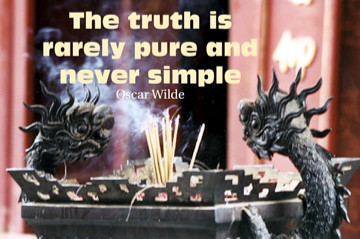 I attended a professional development day in Sydney this week to explore the new texts on the HSC English list for 2009-2012. The texts set for study change every couple of years and I welcome the list as progressive mix of canonical prose fiction, multimedia, poetry, film and drama. The most interesting, and I think significant, inclusion in this list is the study of Wikipedia as a “text”. The focus is on the changing conception of authorship and the related debate about the “reliability” of information in the connected world we live in. It is an important lesson, in the words of Oscar Wilde, that “the truth is never pure and rarely simple”.
I attended a professional development day in Sydney this week to explore the new texts on the HSC English list for 2009-2012. The texts set for study change every couple of years and I welcome the list as progressive mix of canonical prose fiction, multimedia, poetry, film and drama. The most interesting, and I think significant, inclusion in this list is the study of Wikipedia as a “text”. The focus is on the changing conception of authorship and the related debate about the “reliability” of information in the connected world we live in. It is an important lesson, in the words of Oscar Wilde, that “the truth is never pure and rarely simple”.
This is already being pilloried by tabloid “experts” who lament the loss of the Anglocentric canon. Their implied argument, as expressed in the pithily titled, At sea in Junk, but classics ahoy, that meaning is solely located in 17th-19th century British novels ignores the realities of how we receive and create information and knowledge and how we reflect our experiences through language and image in the 21st century world. One such argument in the article above is that “camera angles in the Australian movie Ten Canoes, which is spoken mainly in the indigenous language Ganalbingu, or deconstructing a website on multiculturalism would hardly seem to have much to do with the study of English in high school.” The article, of course, ignores the inclusion of Hamlet, As You Like It, Richard III, John Donne’s poetry and Jane Eyre to name a few.
This course offers students an engaging and meaningful mix of “important” classics and alternative film and fiction from Shakespeare, Blake, Mary Shelley to Blade Runner, Run, Lola, Run and Lost in Translation. When I studied the equivalent course in 1992, it was the sole precinct of Jane Austen, Shakespeare, Keats, Yeats and Coleridge. While I loved these works, the course was so homogenised and limited in its appeal that in a sizeable co-ed school, not one boy chose to do the course. Students have the right to be able to study more contemporary texts that reflect their own experiences. This is especially so given that the study of English is the one mandatory course and it was heartening to hear that a key determinant in the choice of these new texts was a consideration of what students would find appealing. It is also promising that the course recognises that students need to have the skills to analyse the multi-modal forms that are the predominant sources of their information.
The board states that this “literary feast” “provides a broad mix of Australian content, classic and contemporary literature and film for students of HSC Standard, Advanced and Extension 1 English and English as a Second Language courses.
There is still a strong contingent of classic authors including Shakespeare, Jane Austen, Emily Brontë, George Bernard Shaw, Virginia Woolf, William Blake and Henry Lawson, but there are also many modern stories such as David Malouf’s Fly Away Peter, Gail Jones’ Sixty Lights, Michael Ondaatje’s In the Skin of a Lion, Tim Winton’s Cloudstreet, Jhumpa Lahiri’s The Namesake and Mark Haddon’s The Curious Incident of the Dog in the Night-time.
The new print texts include 11 Australian fiction and non-fiction books, bolstering the existing Australian content.
The new texts include:
- Patrick White’s The Aunt’s Story
- Raimond Gaita’s Romulus, My Father
- Contemporary Indigenous Plays, ‘Rainbow’s End’
- Robert Dessaix’s Night Letters
- Tara June Winch’s Swallow the Air
- Penguin Banjo Paterson Collected Verse.
New films for study include Rolf De Heer’s Ten Canoes, Alfred Hitchcock’s Rear Window, Stanley Kubrick’s 2001: A Space Odyssey, Sofia Coppola’s Lost in Translation and Stephen Frears’ The Queen.”